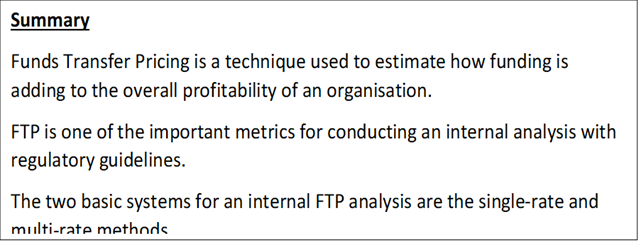What do you mean by Funds Transfer Pricing?
Funds Transfer Pricing (FTP) is a framework used to assess how funding adds to an organisation's general productivity. FTP finds its most critical use in the financial business, where monetary foundations use FTP to break down the qualities and failings of the firm within the organisation. FTP may likewise assist with deciding the benefit of different product offerings the bank offers, the presentation of branch outlets, and judge the adequacy of cycles.
FTP is not the same as transfer pricing, an accounting method that addresses the suggested costs that one division in an organisation charges another division for labour and products.

Copyright © 2021 Kalkine Media
Understanding Funds Transfer Pricing
FTP is utilised to change the detailed presentation of various specialty units of a monetary foundation. A financial foundation could have multiple types of units. FTP can be perceived as a system for circulating income between benefit focuses, adding to better monetary execution assessment of these specialty units. The split of these units between fundraising and deposit-advancing teams influences whether they get a positive or negative income change. Both are acquiring and loaning add to the exhibition of the bank in general. FTP is an instrument to change these profitabilities to fuse actual subsidising costs. Hence, FTP can be viewed as an interior estimation apparatus to show the economic effect of the destination and source of funds.
The two significant goals of FTP in monetary foundations are inspiring beneficial activities and practically identical financial execution assessment among specialty units, and when appropriately used, move estimating frameworks permit financial execution assessment of net asset generators and net asset users. Without an FTP framework, net asset clients get credit for interest pay without being charged for the aggregate sum of interest cost related. In contrast, net asset generators are set by interest cost without being credited with income of interest related. In such a case, net asset clients enjoy a benefit since all interest incomes are connected to monetary resources, and all economic costs are linked to financial liabilities. This distorts business units' financial exhibition as net fund clients introduce themselves as more productive than net fund providers.
FTP is a significant idea of how monetary organizations decide the inward cost when dispensing assets across various specialty units. The Organization for Economic Co-activity and Development (OECD) suggests that each financial establishment ought to have its FTP strategy administering the premise on which assets are moved between various specialty units and treasury. In monetary foundations embracing FTP, the depository is liable for liquidity management and the inside estimating of support to its distinctive specialty units. One can consider the treasury a monetary organization inside the financial foundation: it purchases assets from the specialty units, dealing with the risk side of the economic establishment, and offers assets to the divisions that put resources into banking resources.
The board decided to receive FTP should know about two common issues. First, the board needs to determine an asset move evaluating financing cost, which aligns with the association's methodology. Net fund generators profit with higher asset transfer price interest costs while net asset clients profit with lower fund transfer revenue rates. Second, the board needs to implement a move estimating strategy as some specialty units may need motivators to embrace such an approach. Although asset transfer cost doesn't twist the investigation of the monetary presentation of the association, utilizing fund transfer pricing, some business units might be making a misfortune although the association is beneficial.
Numerous banks use FTP charting to dissect financing by area. In this model, bank management would utilise FTP to decide the benefit of assets at singular divisions. This investigation considers the accounts each branch gets, the sum gave as advances, just as the quantity of clients the area serves. By chance that a specific arm is consistently failing to meet expectations set up baselines or announcing huge decreases, then, at that point, it can prompt a branch conclusion choice. When a branch closes, it will move records and assets to another addition nearby.
Since the 2008 financial crisis, the Dodd-Frank Reform Act has fundamentally centred around expanding the managed level of fluid cash flow to assist with lessening hazards across the biggest banks. Funds transfer pricing examination has also acquired bank chiefs' expanded consideration, yet direction has been more casually presented instead of order.

Copyright © 2021 Kalkine Media
Frequently Asked Questions
What are the methods for FTP?
There is an assortment of philosophies for FTP utilised in the financial business. Two essential strategies incorporate single-rate and multi-rate. Single rate provides a thorough perspective on resources versus liabilities by development. With the single-rate technique, all resources and liabilities are treated on a single exchange rate paying little heed to the idea of the item.
The multi-rate technique breaks resources and liabilities into different gatherings dependent on attributes. With the multi-rate approach, the board has a more granular perspective on hazards. The multi-rate system is frequently for product and maturity breakouts. In these breakouts, a portion of the finer subtleties of thought may likewise incorporate the subsidizing liquidity spread, the unexpected liquidity spread, the credit spread, the option spread, and the basis spread.
FTP charting is a piece of all strategies with graphs addressing the pooled information across resources and liabilities. As a rule, it graphs the relationship between time-to-maturity and yield-to-maturity. Charting can be tweaked dependent on technique and report necessities. Inside, monetary establishments will have an interface that incorporates the entirety of the excellent level FTP measurements.
 Please wait processing your request...
Please wait processing your request...